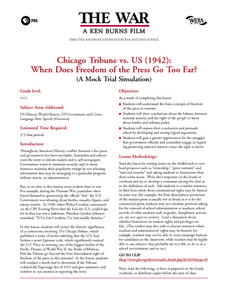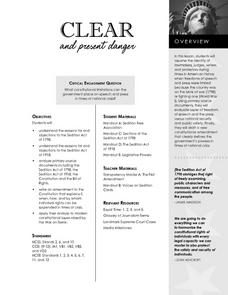Newseum
Are You a Publisher?: Free Press and You
What kinds of media do your pupils use to read and publish information? After a discussion about what publishing means, and about the freedom of the press, class members interview one or two other people about their publishing habits....
Facing History and Ourselves
The Importance of a Free Press
"Congress shall make no law . . . abridging the freedom of speech, or of the press;. . ." Why is this guarantee of free speech and a free press the First Amendment to the US Constitution? Why are these rights so essential to a democracy?...
Deliberating in a Democracy
Free and Independent Press
Young scholars determine how free press principles can be compromised. For this global studies activity, students read an article titled "Free and Independent Press." Young scholars respond to discussion questions regarding the article.
Newseum
Free Press Challenges Through History: Analyzing Historical Sources
The debate over the integrity of stories in media is not new. Young journalists analyze historical sources that reveal freedom of the press controversies and draw parallels to challenges freedom of the press faces today.
Newseum
The Press and the Presidency: Friend or Foe? How the President Is Portrayed
In theory, news reports should be fair and unbiased. Young journalists test this theory by selecting a current news story covered by various media outlets about the President of the United States. They then locate and analyze five...
Facing History and Ourselves
Free Press Makes Democracy Work
A unit study of the importance of a free press in a democracy begins with class members listening to a podcast featuring two journalists, one from a United States public radio station and one from Capetown, South Africa. The...
Constitutional Rights Foundation
Why We Have Freedom of the Press
A newspaper receives documents that reveal not only a devastating secret the public needs to know, but also troop movements that could put American lives at risk: to publish or not to publish? Using background readings, discussion...
Curated OER
The Laundry News
In this reading worksheet, students answer 10 multiple-choice questions about the book. For example, "What happened to the very first edition of the Laundry News?"
Newseum
'The Press and the Civil Rights Movement' Video Lesson
Scholars watch a video featuring journalists who covered the civil rights movement, then respond to questions on a viewing guide. The video features interviews with participants and original news footage from the 1950s and 1960s. In...
Media Smarts
You Be the Editor
Look at different case studies to discuss the ethics of journalism. Twelve real-life events are written up and your learners get to be the editors. Encourage your class to think about the implications of publishing decisions. After each...
Curated OER
War and the Media Press Freedom vs. Military Censorship
Students analyze the relationship between war and media. In this media awareness lesson, students listen to their instructor present a lecture on freedom of the press and military censorship. Students participate in an activity connected...
Curated OER
Chicago Tribune vs. US (1942): When Does Freedom of the Press Go Too Far?
Students define freedom of the press in peace and war time. As a class, they identify the need for the public to be informed, but discuss where the line should be drawn to protect national security. They develop their arguments and...
Curated OER
What are the benefits of having a Free Press?
Young scholars examine why actual malice is necessary in libel cases. Students demonstrate the importance of a third party in libel and slander cases. They analyze why a free press is essential in American society.
Curated OER
Consequences of the Sedition Act
High schoolers research and discuss the consequences of the Sedition Act. They illustrate the difficulty of balancing security needs and personal freedom using an example from John Adams's presidency.
Social Media Toolbox
A Look at Social Media Policies
Should school news publications use social media if their district is against the use of social media in school? Pupils ponder the policy, then examine their publication's plan in parts seven and eight of a 16-part Social Media Toolbox...
Curated OER
A Way with Words
How do facts and opinions impact the news? After reading "How to Cover a War" from the New York Times, middle schoolers evaluate the claims in the article. They also consider the media's responsibilities in reporting during wartime....
Curated OER
Freedom of the Press Around the World
Learners research press freedoms in various countries such as Iran and North Korea. They create a freedom of the press report card for the countries examined.
Curated OER
Writing a Newspaper Article
The perfect resource for a beginning journalism teacher or someone designing a journalism unit, this activity prompts young scholars to write a newspaper article. It covers all aspects of the writing process, such as a guided warm-up...
Newseum
Photo Ethics: News Independence
Young journalists read a case study about an annual school tradition of a streaker running across the football field after the homecoming game. Small groups then decide whether or not to cover the story and whether or not to include a...
Curated OER
Citizen Journalism
Students examine the role of citizen journalism, freedom of the press, and the First Amendment. They analyze the results of an Internet survey, discuss the ethics of downloading copyrighted material on the Internet, and write a news story.
Curated OER
Breaking News: Syria Protests Getting Bigger (April 16th, 2011)
Young scholars explore current events by participating in several worksheet style activities. In this Syrian protest lesson, students read a news article discussing the Syrian uprising that took place in April of 2011. Young scholars...
Pulitzer Center
Facing Risk: Journalists and their Families
Facing Risk is a powerful film that urges journalists who are committed to reporting from the world's hotspots to engage in difficult but essential conversations with their families before leaving on assignment. Interviews with kidnapped...
Curated OER
Clear and Present Danger
Students assume identities of lawmakers, judges, writers, and protestors during times in American history when freedoms of speech and press were limited because country was on the brink of war or fighting one. Students use primary source...
Curated OER
Press Freedom Versus Military Censorship
Eleventh graders explore the term terrorism. In this US History lesson, 11th graders participate in a press release on terrorism.

























